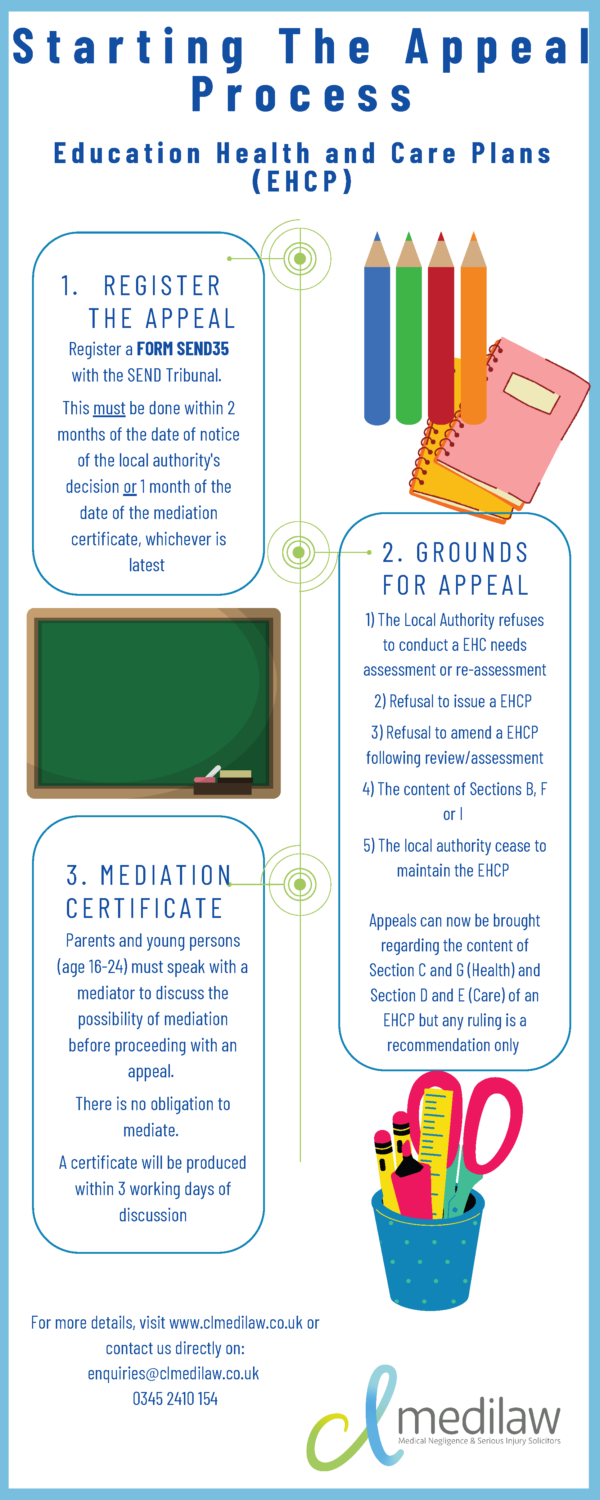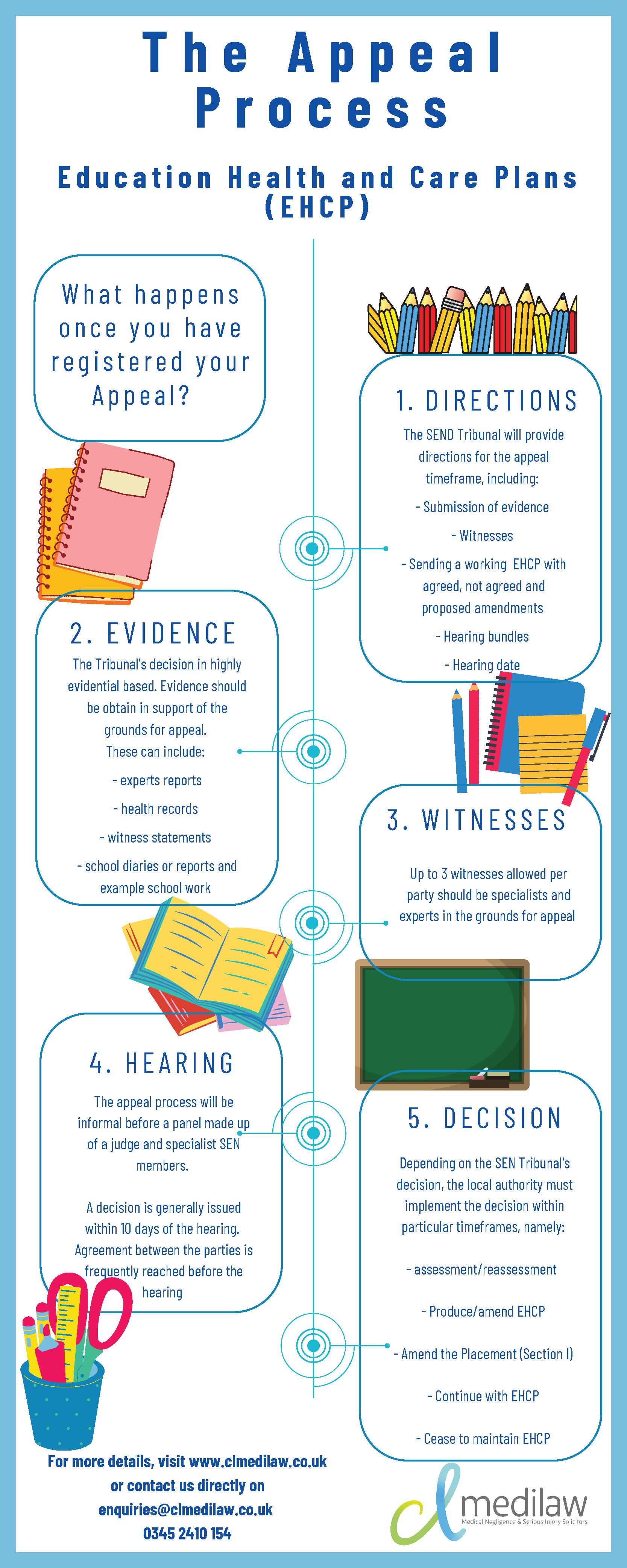The Appeal Process
Information brought to you from
Appeals are brought at the Special Educational Needs and Disability (SEND) Tribunal.
The process is designed to be accessible to parents and young people with numerous platforms, charities and organisations producing tips and guidance freely available to access online.
On what grounds can an appeal be made
There are various grounds on which an appeal to the SEND Tribunal can be brought. These include:
- The local authority refuses to conduct an educational health and care needs assessment or re-assessment
- Refusal to issue an EHCP
- Refusal to amend an EHCP following a review or reassessment
- The content of Sections B, F or I of the EHCP
- The local authority ceasing to maintain the EHCP
Since August 2021, following a trial period the Department for Education confirmed that appeals could be brought when disputes arise from
i) Section C and G – Health; and
ii) Section D and H – Social Care. Appeals relating to health and social care are now referred to as “extended appeals”.
Any findings by the tribunal about health and social care needs are recommendations only.
Steps to start an appeal

Steps to start an appeal
To do this a parent or young person (aged 16 – 24) should complete the appeal form (FORM SEND35: Special Educational Needs and Disability Tribunal appeal), setting out the grounds of appeal and all evidence in support.
The SEND Tribunal will send the appeal documentation to the local authority.
There are various grounds on which an appeal to the SEND Tribunal can be brought. These include:
• The local authority refuses to conduct an educational health and care needs assessment or re-assessment
• Refusal to issue an EHCP
• Refusal to amend an EHCP following a review or reassessment
• The content of Sections B, F or I of the EHCP
• The local authority ceasing to maintain the EHCP
Since August 2021, following a trial period the Department for Education confirmed that appeals could be brought when disputes arise from i) Section C and G – Health; and ii) Section D and H – Social Care. Appeals relating to health and social care are now referred to as “extended appeals”. Any findings by the tribunal about health and social care needs are recommendations only.
Evidence
The key to any EHCP appeal is the evidence. The SEND Tribunal’s decisions are highly evidential based therefore it is important to consider what evidence you require to prove your case.
If an appeal focuses around the content of the EHCP and provision made in Section F for example, it would be advisable to consider obtaining expert reports, health reports or records in support of this provision, together with witness statements from the parents or young person or their treating clinicians. In addition, it is worth considering school diaries and reports and example schoolwork to demonstrate why certain provision should be included or amended.
It is also important to remember that Sections of the EHCP are linked. Therefore if an appeal is brought in respect of Section I (Placement), then it is important to ensure representations are also made in respect of Section B and F to ensure all and any amendments are in keeping. It might be that the placement named in the Section I is unsuitable for your child and therefore, the SEND Tribunal should be directed to Section B and F to explain how the school is unable to meet those provisions and outcomes in the EHCP.
Parents and young persons should also consider whether the local authority should be asked to carry out an assessment if required.
Witnesses
Each party is usually allowed up to three witnesses although parents can ask the SEND Tribunal to consider allowing more. It is important to consider who should be a witness. The witness should have expertise for the grounds on which the appeal is brought. For example, if the EHCP has inadequate provisions for physiotherapy, then a Physiotherapist already known to the child would be the ideal witness. Similarly, if the appeal surrounds the named placement, a member of staff from the preferable school could be called as a witness.
Mediation Certificate
It is important to remember that before an appeal is registered with the SEND Tribunal, a parent or young person is required to show that they have spoken with a mediator to discuss the possibility of mediation before proceeding with an appeal.
This doesn’t mean the parent or young person is obliged to engage in mediation but they must have spoken with a mediator to consider the possibility ahead of registering an appeal.
The mediator will produce a mediation certificate within 3 working days of the discussion.
It is worth noting that if an appeal relates solely to Section I (Placement) then parents and young persons are not required to contact a mediator ahead of making an appeal.
What happens after the SEND Tribunal’s decision
The SEND Tribunal generally issues its decision within 10 working days of the hearing. However, parties can, and frequently do, reach agreement before the hearing.
If the hearing proceeds, depending on the SEND Tribunal’s decision, the local authority must implement the decision within particular timeframes, namely:
- Start assessment/reassessment within 4 weeks of decision
- Produce/Amend an EHCP within 5 weeks of decision
- Amend the Placement (Section I) within 2 weeks of the decision
- Continue the EHCP with immediate effect
- Cease to maintain an EHCP with immediate effect

If you are not happy with the outcome of the SEND Tribunal’s decision, an application can be made to the Tribunal to ask for the decision to be set aside, reviewed or appealed. Any application must be made and received by the SEND Tribunal within 28 days of their issued decision. The Tribunal might consider an extension beyond the 28 days but evidence must be provided as to why more time is needed.
Appeal: A party can only appeal a SEND Tribunal decision if it can demonstrate that the SEND Tribunal made or may have made an error of law. Therefore, an appeal cannot be made on the grounds that a party disagrees with their decision. An error of law might include:
• The Tribunal did not apply the correct law or wrongly interpreted the law
• The Tribunal made a procedural error
• The Tribunal had no evidence or not enough evidence to support its decision
• The Tribunal did not give adequate reason for its decision
An application (SEND20A) must be made to the SEND Tribunal for permission to appeal. If the Tribunal decides to grant permission to appeal, a Notice of
Appeal will need to be completed to the Upper Tribunal (Administrative Appeals Chambers) no later than one month after the Tribunal sends its decision. If permission to appeal is refused, parties have the right to apply for permission to appeal from the Upper Tribunal no later than one month after the Tribunal sends its decision.
Appeals against decision of the SEND Tribunal can be very difficult and there must be strong arguments to show that the SEND Tribunal made a substantive error of law.
Review: If there has been a change in circumstances since the case was heard before the SEND Tribunal and it is considered that the decision should be reviewed in light of this, you can ask the Tribunal to review its decision. An application SEND20B should be made and the Tribunal will decide whether a paper application is sufficient or an oral hearing is necessary.
Parties can apply for permission to appeal against the amended decision (if granted) if they consider there is an error of law by sending application SEND20A to the Tribunal.
Set aside: The SEND Tribunal are able to set aside and remake a decision if there has been a procedural error putting either party at a disadvantage. It must be in the interests of justice for the decision to be set aside. This means that the SEND Tribunal will consider whether there was any procedural irregularity resulting in a party being treated unfairly. The parties must also show that one or more of the following applies:
A document relating to the proceedings was not seen, or not received at an appropriate time by a party or party’s representative
A document relating to proceedings was not sent to the SEND Tribunal at an appropriate time
A party, or party’s representative, was not present at a hearing relating to the proceedings
There has been some other procedural irregularity in the proceedings
An application (SEND20C) should be made to the Tribunal. If the Tribunal agree to set aside all or part of their decision a hearing will usually be held remaking the decision and parties have the right to attend. If the Tribunal do not agree to set aside all or part of their decision, then providing there is an error of law, you can apply for permission to appeal to by sending application SEND20A to the Tribunal.

